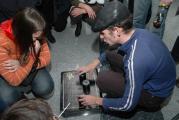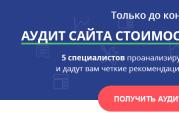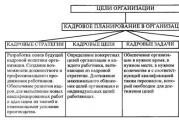Chernenko konstantin ustinovich foreign and domestic policy. Konstantin Chernenko - General Secretary of the Central Committee of the Communist Party of the Soviet Union
Good afternoon, dear readers!
This time we will consider a brief description of the activities of Yu.V. Andropov. and K. Chernenko. Their time of "reign" was very short and was not marked by any grandiose events and changes, but, nevertheless, it is necessary to consider their small role in the history of our Fatherland.
It is worth saying that both figures also relate to the concept of "gerontocracy" in the Soviet period. Andropov became in the gravel of the country at 68, Chernenko at 73, and both ceased their activities due to death.
Yu.V. Andropov became General Secretary of the CPSU Central Committee in November 1982. From the very beginning of his activity as head of the Union, he began to act actively. In his reports and works, he spoke positively about the work of the previous General Secretary (Brezhnev) and pointed out his plans to continue state work in the same direction, but with greater zeal. “Labor productivity is growing at a rate that cannot satisfy us,” Andropov emphasized in one of his reports. In order to stimulate lazy Soviet society to productive work, he took the following measures:
- Made a personnel reshuffle in the "top" of the party
- He announced the beginning of an intensified fight against corruption, which proliferated due to Brezhnev's conniving attitude (soon the fight against this type of offense subsided)
- Strengthened measures to strengthen discipline (catching latecomers walking in the streets and shops during working hours, etc.)
- In June 1983, the law "On labor collectives and increasing their role in the management of enterprises, institutions, organizations" was adopted (but the law remained nominal, since command and administrative methods of management remained a priority in the economy)
Konstantin Ustinovich was already sick at that time. He was distinguished by a gentle character and indecision, was an ideal candidate for an "intermediate figure". The new leader continued his activities in line with the previous head of government. At the end of 1984, the program “To the level of the requirements of developed socialism. Some Actual Problems of Theory, Strategy and Tactics of the CPSU ”, in which the lagging behind of the USSR from the capitalist countries was noted, and an orientation was given to improve socialism and raise the country's economy. During his short tenure as General Secretary of the CPSU Central Committee, he tried to fight the shadow economy, start a policy of acceleration and undertake some reforms. It is worth noting that it was under Chernenko in 1984 that our beloved Day of Knowledge (September 1) was introduced by all of us. Also under him, the Union national team refused to take part in the 1984 Olympics, held in Los Angeles, in response to the boycott of America in 1980.
On February 10, 1985, Chernenko died of cardiac arrest. His departure marked the end of the era of the reign of the elders; a young and energetic Gorbachev was appointed in his place.
As the crisis intensified, forces were ripening capable of fighting them. Their most prominent representative was Yuri Vladimirovich Andropov, who came to power in November 1982 after the death of L.I. Brezhnev and who began the struggle for the revival of the Leninist concept of socialism, taking into account the realities of his time with the strengthening of labor and state discipline, the fight against corruption.
As a personality, Yu. V. Andropov was significantly different from many political figures of his time. He was a man of a sharp and tenacious mind, distinguished by a responsible attitude to business, knowing the real situation in the country and society. To this characteristic can be added a high level of culture, personal modesty and selflessness. At the same time, as a politician of his time, he was a clear representative of a tough, forceful manner of action.
Andropov strove to achieve better affairs in all sectors of the country's socio-economic development, using command methods. The main stake was placed on strengthening managerial, labor, and party discipline. For 15 months - from mid-November 1982 to mid-February 1984, 18 union ministers, 37 first secretaries of regional committees, regional committees of the CPSU, and the Central Committee of the Communist Party of the Union republics were replaced.
Measures to restore order and discipline had a certain effect, set in motion a number of reserves, and made it possible to temporarily block the development of negative trends. In 1983, statistics recorded the highest rates of development of the country's economy since the early 1980s. If in 1981-1982. they amounted to 3.1 percent, then in 1983 - 4.2 percent.
As a politician, Andropov realistically assessed the socio-political situation of the country. He expressed the idea of \u200b\u200bthe significance of the historical distance that separated the country from the highest stage of the communist formation. Andropov was the initiator of the idea of \u200b\u200bschool reform, put forward proposals on personnel policy, delineation of the power functions of the party and the Soviets, ideological work. His illness changed the balance of power in favor of the conservative wing of the top party leadership.
From the end of September 1983, K.U. Chernenko, Yu.V. Andropov was quickly fading away. Death occurred in February 1984. According to a number of data, it is possible that if he lived longer, the modernization of the Soviet society could proceed according to the Chinese version - that is, gradually and slowly, but in the direction of liberalizing social relations.
The coming of Konstantin Ustinovich Chernenko to power meant a return to the order established under Leonid Brezhnev. It was difficult to imagine a more inappropriate figure in the top post. "He was a terminally ill person," wrote a former member of the Politburo of the Central Committee of the CPSU P. Ye. Shelest, "in the role he was fulfilling, it was a pity to look at him."
The economic indicators of the country's development in 1984 slid sharply downward, indicating the approach of a deep crisis. Probably, it was precisely the months that K.U. Chernenko played the role of the last argument that convinced a group of top party and state leaders of the need for a sharp turn.
In the 70s and 80s, there was a significant erosion of the political leader's charisma, primarily in the faces of L. Brezhnev and K. Chernenko. This was facilitated by both the political inability of the top leaders to resolve the problems that arose in society, and their physical weakness, a vicious passion for ranks, titles and awards.
In general, over the past four decades, the USSR passed a difficult historical path: from the tightening of Stalin's personal power, then liberal initiatives of the "thaw" period, their curtailment and stabilization, the strengthening of the positions of the party-state bureaucracy to a steady slide into a state of economic stagnation, an ever greater separation official ideological attitudes from social practice.
The April (1985) Plenum of the Central Committee of the CPSU was a natural reaction of sane forces in the country's leadership to the growing threat of a total crisis.
Konstantin Ustinovich Chernenko was elected to his post of the Communist Party of Yu. Andropov. For many, this appointment was a surprise, since the new secretary general had multiple health problems and, apparently, did not apply for this position at all. As a result, he stayed in his post for no more than a year and died of acute heart and liver failure.
Konstantin Chernenko, biography: early years of life
The future secretary general was born in 1911 on September 11 into a peasant family. His childhood was spent in the distant Siberian village of Bolshaya Tes (flooded by waters in the Yenisei province since 1972. Its roots come from Little Russia (Ukraine). Back in the 18th century, Chernenko's ancestors settled on the banks of the Yenisei and began to engage in agriculture. His father, Ustin Demidovich , after the death of his first wife, mother of Konstantin and the other three children, he married a second time.But the relationship between the stepmother with two stepsons and two stepdaughters did not work out, and they had a difficult life in their father's house. As a child, Konstantin Chernenko worked for local kulaks Like all Soviet children, he was accepted as a pioneer, and at the age of 14. He joined the Komsomol, and in 1926-1929 he studied at the school for rural youth in the town of Novoselovo.

Service
In 1931 K. Chernenko was drafted into the army. He received a referral to one of the border military units located in Hogos, on the territory of the Soviet Republic of Kazakhstan (on the border with China). Over the two years of service, Konstantin Chernenko has shown his best side more than once: he took part in the liquidation of the legendary Bekmuratov's gang, became a member of the All-Union Communist Party of Bolsheviks, and was elected secretary of the party organization of the border post.
Carier start
After returning from service, Chernenko was appointed director of the regional house of party education in the city of Krasnoyarsk. Along with this, he became the head of the agitation and propaganda department in the Novoselovsky and Uyarsky regions. After the outbreak of World War II, he was elected secretary of the Communist Party of the Krasnoyarsk Territory. Surely many, having read the biography of Konstantin Chernenko, will be surprised at his luck and ask themselves the question: how did he manage to advance so quickly in the service? There is a version that his sister, Valentina, who was the “friend” of the first secretary of the Communist Party of the Krasnoyarsk Territory, comrade O. Aristov, played a big role in this.

War and post-war years
From 1943-1945 he received a referral to Moscow to study at the higher school of party organizers. In a word, Konstantin Chernenko, whose photo is posted in the article, spent the entire war in the rear and did not participate in any of the hostilities. Nevertheless, during this period he received one award - "For Valiant Labor". While still a student at a party school, he was appointed to the post of secretary of the regional committee of the Penza region, where he worked until 1948. Then, from the center, he received an order to move to the Moldavian SSR and head the propaganda and agitation department of the Central Committee of the republic.
Acquaintance with Brezhnev
In Chisinau, Chernenko meets Leonid Ilyich Brezhnev. This meeting becomes a turning point in his life. The two men begin to feel strong sympathy for each other, which soon develops into a strong friendship. After that, their career paths are intertwined in the most intimate way. In 1953, at the age of 42, Chernenko graduated in absentia from the Pedagogical Institute of Chisinau and received a diploma of higher education. Three years later, returning to Moscow, not without the patronage of Leonid Ilyich, he received the post of head of the propaganda department, and from 1960 to 1965. heads the secretariat of the USSR PVS. In the same year, Chernenko became the head of the main department of the Central Committee, where he worked until 1982. During the same period, he became the secretary of the KP. For many members of the Central Committee, it becomes clear that the closest person for the new secretary general is Konstantin Ustinovich Chernenko. The years were the most fruitful for him, and he climbed the career ladder almost to the very top. In addition to the posts that he officially held, he acted as Leonid Ilyich's most trusted person. Many envied him, but also feared him.

Eminence grise
Sometimes it seemed that the country was ruled not by Brezhnev, but by Konstantin Chernenko, because it was he who performed many functions for the general secretary. And then they called him "the gray eminence", because they guessed that all important decisions come from him. Leonid Ilyich took his opinion into account in almost everything. In short, Chernenko became an indispensable person for him. In addition, Brezhnev felt that no threat to his power emanated from Kostya (as he affectionately called him), since he felt comfortable in the “position” of the country's leader's right hand.
Travel
Brezhnev's dependence on Chernenko reached such proportions that he could not take a step without him. Chernenko accompanied the Secretary General on trips abroad. In 1975, they paid an official visit to Finland, and in 1979 they went to Austria. There were several more visits to socialist countries.
Personal life
K. Chernenko was married twice. His first wife was Faina Vasilievna, who bore him a son and daughter. Several years of married life showed that their marriage was a mistake, and the couple broke up. Nevertheless, Konstantin Ustinovich took care of his children, and in the future was engaged in their promotion up the career ladder. Thus, while still a very young man, his son became the 1st secretary of the city committee of the city of Tomsk. My daughter, Vera, had the opportunity to go to study in Washington. The second time Konstantin Ustinovich married in 1944. Anna Dmitrievna became his new wife. A wise, calculating woman. They say that she knew how to give the right advice to her husband and that it was she who contributed to the emergence of a strong friendship between Brezhnev and Chernenko.

Prophecies ... late
Since 1974, Brezhnev was seriously ill. And his entourage, of course, thought about who would become his successor. Since in those years Chernenko was the closest person to the general secretary, it was he who was considered the main candidate for the post of head of state. However, when in November 1982 Brezhnev died in his sleep, Gromyko and Andropov were the first to be summoned to him. Today, the details of the day of the death of the Soviet leader are already known, and some details give cause for thought. At the bedside of the deceased, in a narrow circle, it was decided that Brezhnev would be replaced as Secretary General ... no, not Chernenko, but Yuri Andropov. However, he did not have to hold this position for a long time, and a year later the prophecies came true: Konstantin Ustinovich became the head of the Soviet Union. There is a version that his election was facilitated by a decision secretly made by the “aging” Politburo, dreaming of restoration, or rather, reanimation of the Brezhnev era.

Chernenko Konstantin Ustinovich: foreign and domestic policy
On February 13, 1984, two months before the death of Yu. Andropov, the country learned the name of the new secretary general. It was Konstantin Chernenko, the same gray eminence under Brezhnev's rule. He was 73 years old and had serious health problems. Nevertheless, the new secretary general took an active part in the creation of the new Constitution of the USSR. During the years of service to the Fatherland, he was three times awarded the Order of the Golden Star and the title of Hero of Socialist Labor.
In April of the same year, after Andropov's death, he was elected chairman of the Presidium of the USSR Armed Forces. During the short time of his reign, despite frequent deterioration in health, Chernenko still managed to mark him with several important events. Under him, several reforms of school education were carried out. September 1 was officially called the Day of Knowledge in the country. Chernenko drew attention to the detrimental influence of Western rock music on young people, as a result of which a struggle was waged in the country against amateur musical groups. As for foreign policy, then during his reign, a warming of relations with the PRC, as well as with Spain, began to be observed. For the first time in the history of diplomatic relations, the king of Spain arrived in Moscow. But with the United States, on the contrary, relations have deteriorated even more. It was decided to boycott the 1984 Summer Olympics in Los Angeles.
More details about 390 days of his reign can be found in the book by Viktor Pribytkov “The Apparatus of Konstantin Chernenko”. There are many interesting factsthat will shed light on that short period in

KU Chernenko died in the hospital in 1985, on March 10, and was the last party leader of the USSR, who was buried at the Kremlin walls.
Konstantin Ustinovich Chernenko (1911-1985) - Soviet statesman and party leader, who held from February 13, 1984 to April 10, 1985. the post of General Secretary of the CPSU Central Committee.
Biography of K. Chernenko briefly
The future leader of the country was born in the Yenisei province, in a peasant family. Having received his primary education, he graduated from the rest of his "universities" along the party line.
In 1929, young Chernenko was appointed head of the agitation and propaganda department of the district committee. Two years later he served in Kazakhstan as a commander of a border detachment, where he joined the ranks of the CPSU (b).
In subsequent years, before the fateful acquaintance in 1950 with L.I. th, was a party functionary of various ranks. Friendship with Brezhnev brought Chernenko to Moscow, to the apparatus of the CPSU Central Committee.
During the reign of L.I. Brezhnev headed the general department of the CPSU Central Committee. Konstantin Ustinovich was called the “secretary” of Brezhnev, so skillfully and promptly he handled documents.
In fact, he became Brezhnev's main adviser, his shadow, and it is no coincidence that Chernenko was seen as Brezhnev's successor. This happened, but only after a short period of Yu.V. Andropov (1982-1984). By this time, Konstantin Ustinovich was seriously ill and was perceived by many as a passing figure.
Main directions of activity
Domestic policy:
- tougher censorship;
- school reform aimed at complementing universal compulsory education with vocational education;
- strengthening trade unions;
- care for veterans of the Great Patriotic War;
- fight against the shadow economy.
Foreign policy:
- warming in international relations;
- detente in relations with China.
Many of K.U. Chernenko remained unfinished or were half-hearted. After his death, a new leader came to power - M.S. and perestroika began.
Board results
- Ideologization of pop and theatrical arts;
- connection of education with production;
- boycott of the Los Angeles Olympics;
- the emergence of a new holiday - the Day of Knowledge.
After Leonid Ilyich Brezhnev died, the post of the first secretary of the Central Committee of the Communist Party was taken by Yu.V. Andropov. The views of this manager were very moderate. Politics Yu.V. Andropova said that over the years the country has accumulated a huge number of unsolved problems that require immediate resolution. The support of the party and the majority of officials by Yu. Andropov got it because he was not talking about cardinal changes in the country, but only about those minimal changes that cause the greatest anger in society. The reforms that Yu.V. Andropov, were met with understanding by the people. Andropov did not have time to realize these plans. He died in February 1984.
K.U. Chernenko
The CPSU Central Committee was headed by K.U. Chernenko. He sought to cleanse the party of negativity, but it was during the years of K.U. Chernenko's disintegration of the party only intensified. But this is not the direct fault of the Secretary General. K.U. Chernenko was very sick and was of old age. He spent more time in hospitals, spas and treatment. At this time, M.S. Gorbachev, who began to rule the country from March 10, 1985, after the death of K.U. Chernenko.
The plenum of the Central Committee of the CPSU, which took place in January 1987, recognized the need for new personnel for the country. To this end, a massive rejuvenation of the party began. Both local and higher authorities were affected by this phenomenon. But the problems in the country were much deeper, the situation could not be solved simply by rejuvenating the managers. In 1988, a regular party congress was held, at which it was decided to change the electoral system in the country. In the spring of 1989, the first "democratic" elections took place. The chairman of the government, formed as a result of the elections, was M.S. Gorbachev.
During the years of perestroika, the USSR made the transition to a multi-party system. Since 1988, the first opposition parties began to appear in the USSR. The changes also affected the CPSU itself. The party was sharply divided into several streams. Three wings were formed: traditional, moderate renovation and radical. As a result of the contradictions, the authority of the CPSU was undermined. People began to leave the ranks of the party en masse. Between 1986 and 1991, about 15 million people left the CPSU. As a result, M.S. Gorbachev began to rapidly lose his position.
On March 11, 1990, Lithuania, the first of the union republics, declared its independence. This threatened the very existence of the USSR. In response, tough blockade measures were taken against Lithuania. Additional troops were brought into Lithuania. However, by the summer of 1991, almost all union republics had declared their independence. M.S. Gorbachev was in a hurry to create a new union treaty. The representatives of the republics were supposed to sign this agreement on August 20. On August 19, the GKChP body was created, whose functions were to stabilize the situation in the country. However, the democratic forces in the country declared this body illegal and called on people to take to the streets to protest. On August 21, an emergency congress of the Supreme Soviet was convened, which declared the illegality of the actions of the State Emergency Committee, whose representatives were arrested. These events finally undermined the faith in power. All union republics refused to sign the union treaty.
In December 1991, three people ceased to exist in the USSR. Representatives of Russia, Ukraine and Belarus signed an act that invalidated the union treaty of 1922. The USSR ceased to exist, it was replaced by the CIS (Union of Independent States). All union republics, except for Georgia and the Baltic states, were included in the CIS. This meant the end of the existence of the USSR. Immediately after these events, M.S. Gorbachev resigned.
During the years of perestroika, the leaders of the USSR planned to reform the country, but made a mistake with the methods of reform.




